- Home
- Andrew McGahan
The Ocean of the Dead: Ship Kings 4 Page 8
The Ocean of the Dead: Ship Kings 4 Read online
Page 8
She nodded, smiling wearily as she began to remove her finery of the day, somewhat dishevelled by now. ‘So I hoped. I may refuse to be scapegoat to this crew, but that doesn’t mean their wellbeing is not my responsibility. They needed something to lift their spirits.’
Dow traced a finger upon her cheek, where streaks of glowing cosmetic were still visible, outlining her scars. ‘And this? What does this mean, for one who doesn’t want to be singled out as mysterious and different?’
Her smile faded to thoughtfulness. ‘Sometimes a little mystery is good in those who lead. People need to feel that those they follow are different. Otherwise, why follow? So just for tonight I was prepared to give them what they expect of me, half an enchantress, half a queen . . .’
‘And why not tell me about it beforehand?’
‘I wanted you to enjoy it fresh like everyone else. Besides, it was more fun to keep you guessing.’
‘Any other surprises then?’
‘Just one,’ she said, and now her smile was quite wicked. ‘I approved a last special requisition from the stores – of fresh water.’
She ushered him into the bathroom where, wonder of wonders, for the first time in months the iron tub was full of the precious liquid, cool and clear – and quite roomy enough for them both.
In all, a fine Doldrums day, Dow reflected later, drifting off to sleep at Nell’s side, their bed sheet-less in the heat and the smell of soap on their skin.
A perfect day even.
*
But later still, he started awake to find himself drenched in sweat and alone. Nell was gone.
This was not so unusual – one or the other of them was often up and about while the other slept – but, moved by some inner warning, Dow rose and ventured out into the day room, which was lit only by the lamp glow from the main deck leaking in through the forward window.
Nell was at that window, a bare shape in silhouette, seemingly staring out to the night.
‘Is something wrong?’ Dow asked softly.
There was no response. He stepped closer, and saw that she stood with her hands clenched in fists at her sides. Alarmed, he came to her shoulder. She was taut, her neck straining, her back stiff, and her eyes rolled white, staring hideously out to the darkness.
He laid a hand gently on her rigid arm. ‘Nell.’
She shuddered, but her eyes stayed white. ‘No wind,’ she moaned, a low sound in her throat. ‘No wind . . .’
‘I know. But it will come back sooner or later.’
Her head shook in minimal yet frantic movements. ‘It won’t. Never again. I’ll be lost there forever.’
Dow took hold of her shoulders. ‘Nell, wake up!’
Her head began to twist wildly. ‘Throw it away; throw it away! The other one can see it. Can see us!’
She was screaming now. Then all at once it was gone, her eyes rolling down again and her body collapsing, so that if Dow had not been there to catch her she would have fallen. He hauled her to the couch even as she came awake, wide-eyed and trembling.
‘Where am I?’ she asked. ‘Where am I? Oh . . . by all that floats, it happened again, didn’t it?’
Dow nodded. ‘Worse than ever. You were standing at the window, and talking. Do you remember what you were saying? What it meant?’
She pushed sweat-plastered hair back from her forehead and gave a long, shivering sigh. ‘I was talking? I don’t remember. There was something, I was somewhere . . .’ Her brow creased, then she shook her head. ‘No, it’s gone. You heard me? What was I saying?’
‘Nothing that made sense.’
‘Damn it. Why can’t I ever remember?’
Dow sat back. All the good of the day had been undone in an instant – even the cool of the bath already forgotten. It was stifling now in the cabin, hotter than the full sunlight of day somehow.
I’ll be lost, Nell had cried. I’ll be lost there forever.
Was that prophecy? Or just a bad dream?
And lost where?
Dow thought he could guess . . .
‘You really couldn’t understand what I was saying?’ she enquired, plaintive in the darkness.
‘No,’ Dow lied. ‘Not a word of it.’
*
A wind came the next morning. It blew them onwards for several days, then failed. The fleet endured another five days becalmed, before a further breeze rose. And so it went. In such fits and starts they progressed, over four slow weeks, maybe three hundred miles deeper into the Barrier.
No disaster plagued them – other than the heat, which grew only more irksome with familiarity – but even so, the hopeful mood raised by Nell’s carnival slowly faded, replaced by a sense of foreboding. The party had been a grand escape, but everyone knew that they could not afford another such indulgence. Not on this side of the world. And meanwhile, with every mile gained, the Barrier seemed to close itself more heavily around them.
The haze reinforced this impression. It had thickened steadily as they moved south, and was now so dense that the horizon was hidden and the sky had turned a permanent smoky brown, through which the sun shone a baleful red, dulled in colour if not in heat. The source of this murk remained a mystery, for it was not smoke, or dust, or even ash from some volcanic eruption – it had not the smell or texture of any of these things – but under its mantle the world was narrowing around the ships to an oppressive few miles of visibility.
The ocean, too, grew clouded. The clear blue water in which Dow and the crew had swum had been left far behind; now the sea was a muddy jade in hue, and the rank seaweed smell had returned. Indeed, seaweed itself began to appear, first as stray strands drifting alone, later in great dense mats floating on the surface, green and smelling of rot, just as Fidel had warned.
But it was the night sky that was causing Dow and his officers the most concern. So thick had the haze become that the stars could no longer be seen through it, not even the brightest, and the moon was only a dimly discernible disc. The gloom made the nights more stifling than ever, but it also presented a technical problem.
‘If it continues like this,’ Fidel cautioned Dow, both of them staring in vain up at the void, ‘then navigation will prove very difficult.’
‘But all that matters is that we hold south, surely?’ said Dow. ‘Our compasses are not affected, and we still have the sun to go by.’
‘Aye. But it’s hard to get a precise fix using the sun alone, and impossible when the horizons are lost. We need the stars for a proper bearing. Without them, we’ll be reduced to estimates only of our position. Yes, our compasses will keep us pointed south, but it’s also vital to exactly measure our rate of progress across the Barrier. Otherwise, all is guesswork.’
‘At least,’ Dow noted, ‘we have you to do the guessing.’ For it was well-known: Fidel had been among the very best navigators in the whole Ship Kings fleet, bettered perhaps by only one man, his friend and the leading navigator of the age – Vincente of the Shinbone.
‘Maybe,’ sighed Fidel. ‘But with no stars by night or horizons by day, navigation becomes more of an art than a science, even for me.’
And yet the nights weren’t entirely without illumination. One evening, as the ships floated at rest during a period becalmed, a cry from the crow’s nest brought Dow and many others to the rail to behold a strange thing. A mile or so off to the east an unearthly blueish-white light was upon the sea; no, it was a glow coming from under the sea. It seemed to form a rough circle some hundreds of yards across, and was moving slowly towards the fleet. Almost, Dow called for the boats to be launched, so that they could tow themselves out of the way – but somehow, nothing about the light seemed perilous.
And indeed, as the illumination came close, its source was revealed to be harmless jellyfish, thousands upon thousands of them in the murky water, their translucent bodies rimmed with a white phosphorescence. So bright a multitude were they that, as they passed beneath, it was as if the two ships were airborne above the lights of a great city. Th
e bizarre creatures paid the fleet no mind, however, only swam languidly on and vanished west.
There were signs of life by day too – less benign than glowing jellyfish. As the seaweed thickened upon the waters, and more great patches of it were encountered, insects began to teem on the surface, feeding on the exposed vegetable matter. Some of them were tiny things like midges or sandflies, rising in clouds when the ships came near and descending on the open decks, biting and stinging and making life a misery for all topside. Others were locust-like creatures that remained hidden and yet shrilled annoyingly by night; and others again were blind, cockroach-like beetles that swarmed up the ships’ sides and in through the open gun ports to invade the lower decks, crunching disgustingly underfoot.
The presence of all these insects summoned hungry predators from the deeps. Many were fish recognisable from the everyday oceans, but others were of species that none in the fleet had ever seen before, some with long feelers that shot out of the water to pluck insects from the seaweed fronds, others with wide gaping mouths that inhaled victims in small whirlpools, others again that leapt bodily out of the sea in pursuit of their prey. Lastly – and most disliked by the crew – were slime-covered eel things that rolled through the weed, trapping swathes of insects in the stickiness of their oozing flanks, before licking off the collected catch with rasp-like tongues.
But although the biting insects and the strange fish made for uncomfortable and uneasy sailing, it was worse when the fields of seaweed drifted away again, taking all such accompanying life with them.
For then the silence returned.
Silence – true silence – was not a thing often encountered at sea. At full sail in a fine wind, ships were a symphony of noise: canvas snapping, shrouds straining, timbers grinding, the sea itself racing along the hull or thumping against the bow. And even in calm seas things were never utterly quiet. The slightest swell would be enough to set a ship rocking and creaking, and small ripples always chattered softly at the waterline.
But here in the Barrier, when the dead calms settled, there were no swells or ripples whatever. The nicre-thick water weighed too heavily on itself, and the ships sat as if mortared in stone. Apart from the noises the crew themselves made, complete silence reigned over the ocean.
By night this was bad enough; sleep became more elusive than ever when every cough or child’s cry rang through the ship. But during the day the silence was more galling yet. As the sun beat down, the quiet was amplified by the heat somehow, building and building and preying on the mind, so that every step on a ladder was like a pistol shot, and every spoken word seemed overloud. The crews took to creeping about the ships and whispering to each other, which in turn only made the silence deeper, and all the more unendurable.
But – as Dow and his officers made sure to keep reminding everyone – none of this was cause for despair. No one had ever died of silence alone. Nor of insects crawling underfoot, nor of the sight of ugly fish, nor even of a starless sky. No, these were mere discomforts all, and the Chloe and the Snout must withstand them, and press on.
Then came the algal blooms.
They struck the first while under sail in a breath of north wind. It was a floating slick of green slimy matter at least a half-mile across. The fleet passed through it without pausing, but the stink was terrible, like meat gone rotten, and the slime clung to the ships for long afterwards. It was different from seaweed, not a mass of fronds but more a soupy mix of particles suspended in the sea, through which green threads like moss were tangled.
No one on board had ever seen algae like this growing mid-ocean before, only in shallow bays where no current flowed and where the water had turned foul. But here in the Doldrums it thrived. The second slick they came across was twice as wide, the third was larger again – fully four miles across. So repellent was it to sail through these blooms, Dow decided that the fleet would steer around the next one, even if it meant going far out of their way. But the fourth slick was so vast that no end or edge to it could be seen through the haze. There was no choice for the fleet but to push slowly on through.
If the other slicks had been unpleasant, this one soon became torment. The rotting stench was overpowering, not just a smell anymore, but a taste in the throat that only grew more nauseating the more one breathed it in. The crews tried closing the gunports to keep out the worst of it, but that only made the lower decks stifling as well as stinking, the fumes becoming almost poisonous, so that sailors stumbled topside, dizzy and vomiting.
From the high deck the view was outlandish. The algae covered the ocean in a vivid green sheet, unruffled even by the breeze that drove the ships, so it seemed that the fleet sailed on no sea at all, but crept across a grassy plain, leaving tracks behind them as grazing sheep might in a lawn. As they progressed, however, the colour of the algae changed, first to a pale lime, then to yellow, then to pink, and finally to red. Such shades might have been pleasing in a flower bed, but when spread across the whole sea – especially the red, which darkened to the colour of blood fresh from a wound – they became noisome, the visual equivalent of the stench that infused the air.
Then torment became torture, for the wind, fickle as it had been, failed altogether, and the fleet was becalmed, trapped amid the red slime and the stench. In the motionless air, mosquito-like insects swarmed up from the blood sea in clouds, and the crew was defenceless against them. Sleep was all but impossible through their constant whine and buzz, and their bites raised up in livid welts on the skin, itching madly, and which, upon being scratched, opened and bled and quickly became infected.
Infection was in the very air, perhaps. For as day followed day and no wind returned, sickness broke out upon both ships, an ague of sweating and trembling and parched lips and headaches. The sick bays filled, and as the becalming stretched to a week, dissatisfied mutters came to Dow from below decks. Magliore was at work, reiterating to his fellows that the fleet sailed without the protection of a scapegoat, and lo, witness this red slime and its fevers that they had drawn to themselves, witness the ill fortune haunting them . . .
‘But this has nothing to do with scapegoats or ill fortune,’ Fidel protested to Dow and Nell. ‘These slimes and their fevers are mentioned commonly in all accounts of the Doldrums, and are to be expected. There is no avoiding them if the Barrier is to be crossed, they are simply a hazard of the passage.’
‘It would help if we could pass through these slimes more rapidly, rather than sit here,’ said Nell. ‘Should we call out the attack boats at last?’
‘We should be loath to do that yet,’ Fidel replied. ‘We are still well within the realm of winds. Maybe six hundred miles we’ve come since our first becalming, but that leaves us far short yet of the inner Barrier.’
‘You’re sure we’ve come no further?’ Dow asked.
‘No, I’m not sure. I have not sighted a star or a clean horizon in weeks now; this haze defeats all. I can only go by the sun, and by marking our speed with use of the knotted rope. But neither is reliable.’
Dow glanced in frustration to the sky. ‘What is this haze, do you think? Where does it come from?’
The old scholar gave a sigh. ‘Most likely from these same slimes and weeds. Wherever there is life, there is death, after all, and as dead things decompose, tiny fragments of matter are lifted into the air by minuscule updrafts. It happens everywhere – but everywhere else, such particles simply blow away, or are cleaned from the air by rain, but as the air here is trapped, circulating only upon itself, and no rain ever falls, the particles linger, and have thickened over the centuries into this everlasting haze.’
Nell looked pained. ‘You mean we’ll have to endure this murk the entire time we remain in the Barrier?’
‘Alas, I think so. We may well not see the open sky again until we reach the southern half of the world. Accordingly, be warned, my navigation will become increasingly uncertain the deeper we go.’
‘Still,’ said Dow, ‘if you believe we are short of
the inner Barrier, then we’ll launch no boats yet, but wait for the wind to return.’
*
But the wind did not return. Instead, ten days into the becalming, the first death of the voyage occurred.
The deceased was an elderly man from New Island, a grandfather too frail for such an expedition in truth, but who had been brought along by his granddaughter, unable to bear the thought of leaving him behind. He died worn out and burning from the algal fever, destined never to behold the New World. The doctors assured Dow that the man’s age had been the key to his death, and that younger and fitter victims of the fever should fare better and eventually recover. Nevertheless, unease swept through the fleet, and when in the days following several children became gravely ill with the ague, their distraught mothers demanded that something be done.
Dow relented, and ordered the attack boats deployed. Fidel was still against the idea, but they had been marooned too long amid the red slime, a fortnight by then, and Dow could not ignore the sinking morale on board his two vessels. It would be a disaster were any of the expedition’s children to die. What was more, he was himself out of patience.
Four boats were lowered from each of the ships, and the tow ropes laid and connected. Upon command, the craft took up the slack and came to full power, and with a slow jerk and sway the ships began to move.
The relief on board was as palpable as a breeze. It was appalling duty, however, for those in the boats, down at the level of the slime, for the attack craft offered no protection from either the mosquitoes or the blazing sun. To lessen their weight, they had been stripped of their wooden decks and iron defence works and spiked rams, and were now bare iron tubs with no more than a wheel amidships, and an engine and shaft in the stern.
But foul as it was for the crews, the propellers still spun efficiently in the red water, and so the fleet progressed well throughout that day, and all through that night. And when the sun rose, a pale line was sighted ahead, which was soon revealed to be a change in the colour of the algal bloom. In the space of only a few dozen yards, in a border that ran east to west beyond sight, the slime turned from blood red to a pure white, as clean as fresh milk.

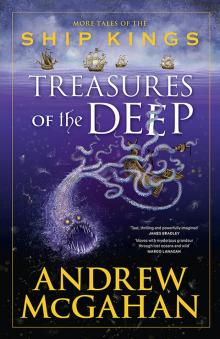 Treasures of the Deep
Treasures of the Deep The Rich Man’s House
The Rich Man’s House Praise
Praise The White Earth
The White Earth 1988
1988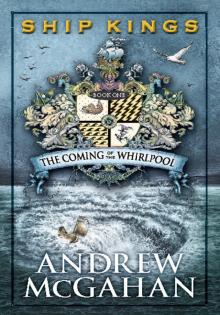 The Coming of the Whirlpool
The Coming of the Whirlpool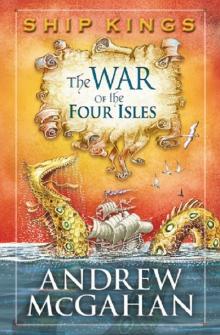 The War of the Four Isles
The War of the Four Isles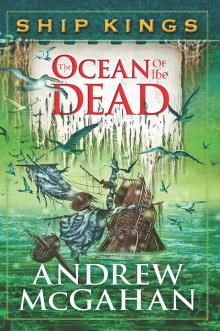 The Ocean of the Dead: Ship Kings 4
The Ocean of the Dead: Ship Kings 4 Last Drinks
Last Drinks Wonders of a Godless World
Wonders of a Godless World Underground
Underground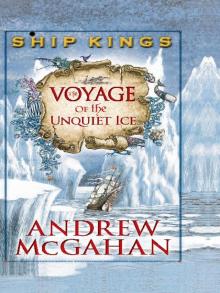 The Voyage of the Unquiet Ice
The Voyage of the Unquiet Ice